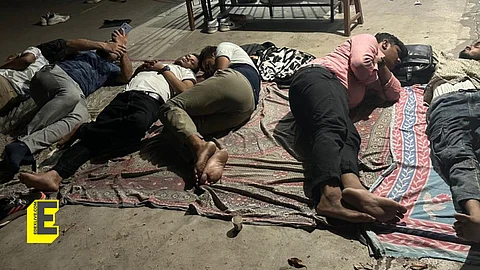

Outside the Bihar Council of Medical Registration (BCMR) office in Patna, hundreds of MBBS graduates flutter in the sweltering June heat, not in hospital corridors where they belong but on protest lines where desperation has driven them.
These are Foreign Medical Graduates (FMG) who cleared the difficult Foreign Medical Graduate Examination (FMGE) in January 2025, yet five months later, they remain trapped in bureaucratic purgatory, unable to begin the Compulsory Rotating Medical Internships (CRMI), essential for their medical registration.
The crisis began when Bihar's medical authorities released internship allotment lists twice, only to withdraw them each time. First, on April 17, citing printing errors, then again on April 22, when the Bihar Health Department nullified the corrected list over alleged violations of National Medical Commission (NMC) guidelines.
Since then, silence. No explanations, no timelines, no accountability, just empty promises that have stretched from days to weeks to months.
Among the protesters, Baibhav Kapoor and Manav P carry stories that mirror hundreds of others, tales of sacrifice, determination, and now, crushing disappointment.
Their journeys began years ago in Kyrgyzstan, where they spent six gruelling years pursuing medical degrees far from home.
"I had to cook, manage everything on my own, and push through all the challenges that come with being far from home in a different country," Baibhav recalls. The investment was enormous, Rs 30 lakh from his family, a sum that represented not just money but collective dreams and sacrifices.
Pranav's path was equally arduous, beginning in 2019 and culminating in his degree completion in 2024. But the challenges extended beyond academics.
"During COVID-19, the fear and uncertainty were overwhelming. We were stranded, separated from our families, and eventually had to be evacuated by Air India," he remembers. "And then in 2024, there were mob lynchings targeting Indian and Pakistani students. It was terrifying."
Both men successfully cleared the FMGE, an achievement that should have marked the beginning of their medical careers in India. Instead, it has become the start of their most frustrating battle yet.
Despite provisional registration in March 2025, they remain in limbo, watching helplessly as their peers from other states begin their internships through transparent, online systems.
"My friends who studied with me and are from other states have already started their internships," Baibhav explains, the comparison highlighting Bihar's systemic failures.
"Their state systems are mostly online, transparent and trackable. But in Bihar, the process is entirely offline, and that leaves a lot of room for mismanagement and corruption."
The personal toll is immense. Pranav's parents, both over 60, carry the burden of significant loans taken for his education. "There's a constant weight on my shoulders to succeed, start earning, and relieve them of that burden," he admits.
The financial pressure compounds the emotional exhaustion of years spent abroad, isolated from family support systems.
Their protest has revealed the complete breakdown of communication between authorities. Calls to senior IAS officers and health department secretaries yield nothing but passed responsibilities.
The Bihar Council of Medical Registration blames the Health Department; the Health Department points back to the Council. Meanwhile, qualified doctors remain unemployed, their stethoscopes gathering dust.
The Registrar keeps telling us the list will come today or tomorrow, but those promises keep getting pushed further every time, Pranav explains.
Yesterday's promise of a 9 pm release became today's delay because the minister was unavailable. When pressed for written assurance, officials scribbled a vague promise on a prescription pad, a gesture that speaks volumes about the casual disregard for their plight.
The implications extend beyond individual frustration. Without completing internships by July 31, 2026, these graduates will miss NEET PG eligibility, effectively losing another year of their lives.
Part of the problem lies in Bihar’s limited capacity. The current 7.5% CRMI seat allocation, amounting to 969 internship seats across the state’s medical colleges, falls far short of demand as more FMGE candidates qualify each year.
Baibhav argues that this seat cap is outdated and unrealistic. Many students are fully qualified but remain unable to start their internships simply because there aren’t enough seats available.
As another scorching day begins outside the BCMR office, these medical graduates continue their protest, qualified doctors reduced to protesters, their expertise wasted while Bihar's healthcare system cries out for more hands.
Their story exposes uncomfortable truths about a medical bureaucracy that desperately needs doctors but seems determined to discourage those willing to serve.
The protest will continue, they insist, until basic dignity is restored, until the system acknowledges that dreams deferred are not dreams denied, and that those who have survived foreign shores and conquered India's toughest medical exam deserve more than bureaucratic indifference.
